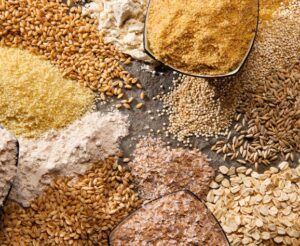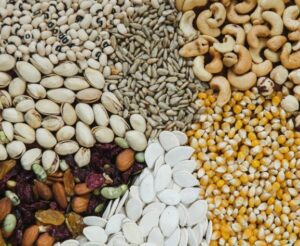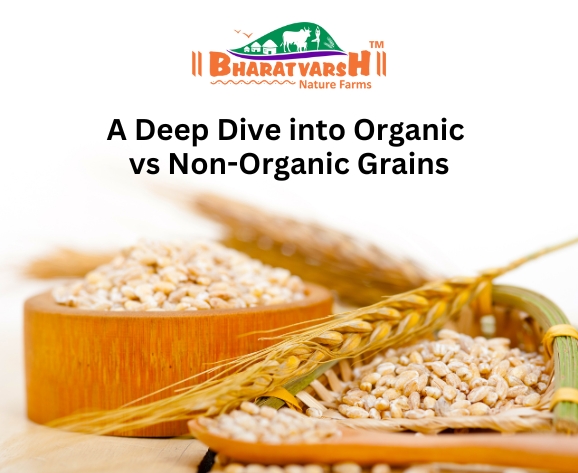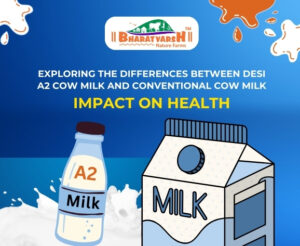In the world of nutrition and sustainable agriculture, the debate between organic and non-organic grains has been gaining momentum. As consumers become more health-conscious and environmentally aware, it’s essential to understand the differences between these two farming practices.
This blog delves deep into the realm of organic vs non-organic grains, shedding light on their benefits, production methods, nutritional value, and their impact on the environment.
Organic vs Non-Organic Grains!
Let’s start with the fundamentals. Organic grains are grown naturally without synthetic pesticides, herbicides, or genetically modified organisms (GMOs). In contrast, non-organic grains are conventionally produced and may involve synthetic chemicals and genetically modified seeds.
Organic Grain Benefits
Organic grains offer several compelling benefits:
- Healthier Option – Organic grains are often considered a healthier choice as they are grown without synthetic chemicals, making them accessible from potentially harmful residues.
- Environmental Sustainability – Organic farming practices prioritize ecological sustainability by promoting biodiversity, reducing soil erosion, and conserving water resources.
- Non-GMO – Organic grains are non-GMO, a significant advantage for those concerned about genetically modified foods.

Non-Organic Grain Production!
On the other hand, non-organic grain production involves conventional farming methods, which may include:
- Synthetic Fertilizers – Conventional farming relies on synthetic fertilizers to enhance crop growth.
- Pesticide Use – Non-organic grains may be treated with pesticides to control pests and diseases.
- Higher Crop Yields – Conventional methods often result in higher crop yields using chemicals and modern technology.
Nutritional Value Comparison
One of the critical aspects of the organic vs non-organic grain debate is their nutritional value. Studies have shown that organic grains can have certain dietary advantages:
- Higher Antioxidant Levels – Organic grains may contain higher levels of antioxidants, which are beneficial for health.
- More Nutrient-Dense – Some studies suggest that organic grains can be more nutrient-dense, providing essential vitamins and minerals.
- Less Pesticide Residue – Organic grains are less likely to have pesticide residues, which can be present in non-organic grains.
Chemical-Free Grain Cultivation!
The use of synthetic fertilizers and pesticides in non-organic grain cultivation raises concerns about the potential harm these chemicals may cause to the environment and human health. Organic grain cultivation offers a chemical-free alternative, contributing to a safer and more sustainable food supply.
Sustainable Grain Farming
Sustainable grain farming is a core principle of organic agriculture. It focuses on:
- Soil Health – Organic farming practices prioritize maintaining soil health, which is essential for long-term sustainability.
- Reduced Erosion – Organic methods reduce soil erosion, preserving fertile topsoil.
- Biodiversity – Organic farms promote biodiversity, creating healthier ecosystems.

Exploring the Costs
Organic products are often perceived as more expensive. This is due to factors like:
- Lower Yields – Organic farming tends to produce lower yields compared to conventional methods, which can increase the cost.
- Labor-Intensive – Organic farming often requires more manual labor, contributing to higher production costs.
Non-Organic Farming Methods
Non-organic farming methods, while criticized for their environmental impact, offer advantages such as:
- Consistency – Conventional methods can provide a more consistent supply of grains.
- Economies of Scale – Large-scale non-organic farming can lead to cost efficiencies and lower prices.
Healthy Organic Grains
Choosing organic grains can be a wise decision for those seeking healthier options and supporting sustainable agriculture. While they may come at a slightly higher price, the long-term benefits to both your health and the environment are substantial.
Synthetic Fertilizers in Farming
Synthetic fertilizers used in non-organic farming can boost crop yields, but they also have drawbacks:
- Environmental Impact – The runoff from synthetic fertilizers can lead to water pollution and harm aquatic ecosystems.
- Soil Degradation – Over time, excessive use of synthetic fertilizers can degrade soil quality.

Non-Organic Pesticide Use!
Pesticides are commonly used in non-organic farming, but they pose environmental and health concerns:
- Residue in Food – Pesticide residues can remain on non-organic grains, potentially entering the human food supply.
- Biodiversity Loss – Pesticides can harm non-target species and reduce biodiversity.
Organic Grain Quality
Many consumers prefer the taste and quality of organic grains, which are often considered to have a richer, more natural flavor.
Conventional Grain Farming Impact: Environmental Concerns
Conventional grain farming practices have raised concerns about their impact on the environment. These include:
- Pesticide Pollution – The use of pesticides can lead to pollution of water sources and harm aquatic life.
- Soil Erosion – Conventional farming can cause soil erosion, reducing the long-term fertility of the land.
Conclusion
In the ongoing debate of organic vs. non-organic grains, the choice ultimately comes down to personal preferences, values, and priorities. Organic grains offer a range of benefits, including better nutritional value, safety from harmful chemicals, and a reduced environmental footprint. However, they do come at a slightly higher cost. Non-organic grains, on the other hand, are known for their higher yields and lower prices but may contain pesticide residues and lack the nutritional richness of their organic counterparts.
In making your choice, it’s essential to consider the impact of your decision on your health, the environment, and the sustainability of our food systems. Whether you opt for organic or non-organic grains, understanding the implications of your choice is the first step in making informed decisions about what you put on your plate.

Key Takeaways
- Organic grains are free from harmful synthetic chemicals, making them a safer choice for consumers.
- Non-organic grain production relies heavily on synthetic pesticides and fertilizers, which can impact human health and the environment.
- Organic grains are non-GMO and promote sustainable farming practices, protecting the environment and soil quality.
- While organic grain prices are higher, the long-term benefits justify the investment for many consumers.
- Non-organic farming practices may result in higher yields but can have adverse effects on the environment and grain quality.
Also Read: ORGANIC FARMING VS. CONVENTIONAL FARMING: UNDERSTANDING THE DIFFERENCES – Bharatvarsh Nature Farms




